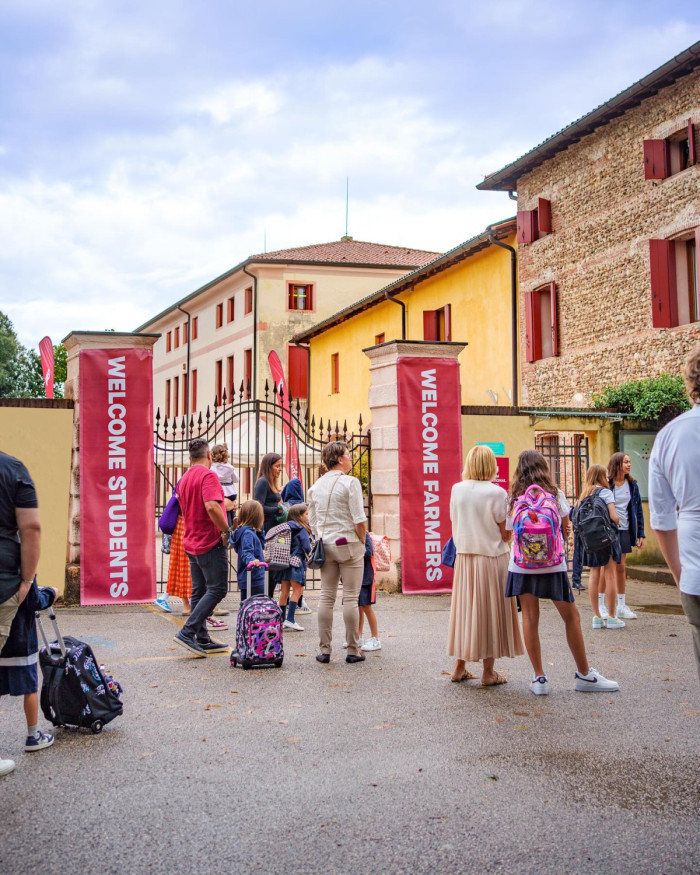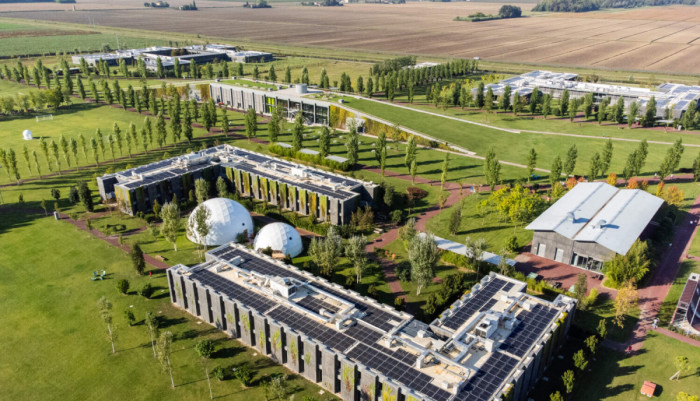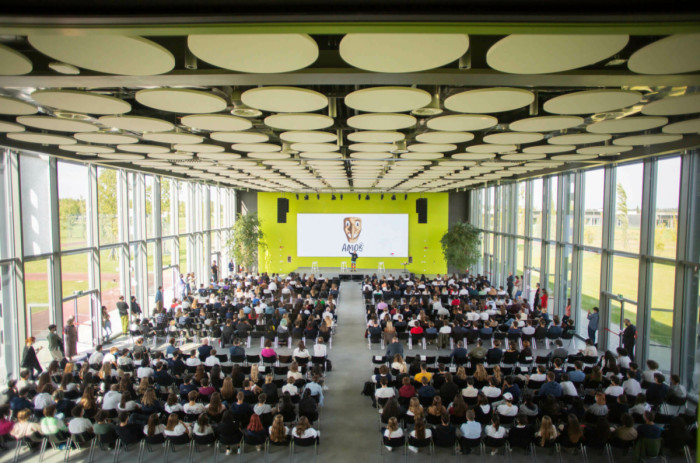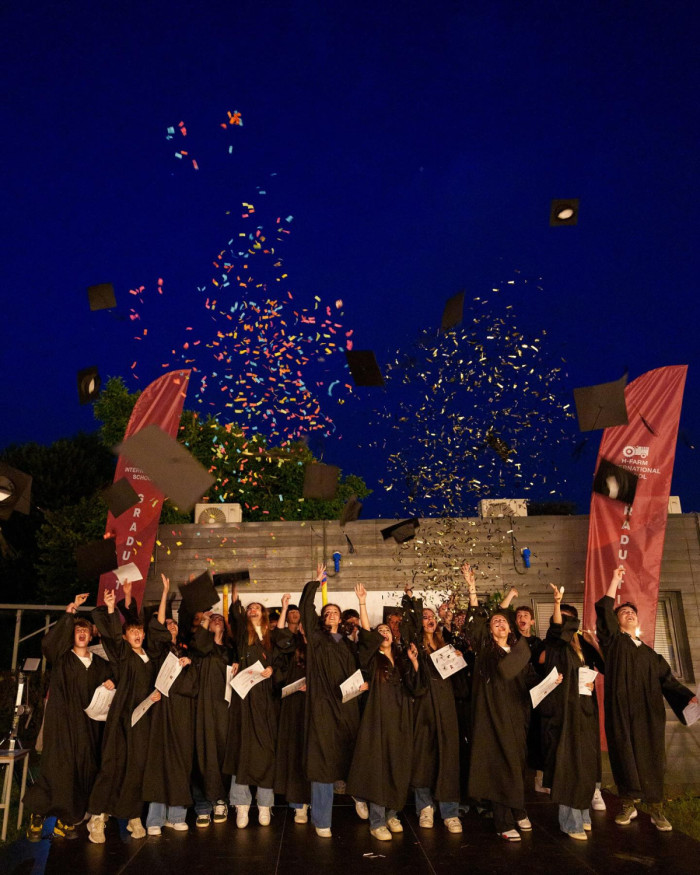H-FARM International school. Student review.
23.10.247216
A fascinating and meaningful interview about studying at the IB program in Italy and feedback about the modern boarding school in Treviso H-FARM.
1. How did you choose H-FARM International School Treviso to study IB program? What drew your attention to this school?
When choosing H-Farm, I didn't know much about international schools. It was something completely new and unknown for me, because before this school I studied at a specialized school in Kyiv. I've seen YouTube videos of kids who have already done IB in different countries, but little was clear when they were rapidly chirping in English, smiling and open. It seemed strange. I thought their emotions were fake, which greatly reduced my interest in finding information about IB. It is because of this that I decided to first answer the question: "Am I even ready to face the completely unknown to me?" Yes, I was ready. The IB does open the door to admission to most universities in the world. This is one of the most difficult programs, and at the same time, it is also the most rewarding. I must study, because the future of my Motherland rests on my shoulders, and I will overcome everything that comes my way. It is in the blood of our people. Therefore, headlong and without a doubt, I just knew that this was my future path. A year later, I became that open, smiling, confident child who was in love with all those "boring" subjects.
I am a big dreamer who hopes to grow in the automotive industry. Often when asked why H-Farm in particular, I joke: "Because they have a tractor on the emblem." I fell in love with the grounds of the school, the design of the buildings, the vast open space. It seemed that it was so easy and neutral there that you wouldn't have to get used to the low orange buildings. The number of projects and guests who came to the school was impressive, which was visible from the pages on social networks. The school seemed new and promising. One who lives, teaches, and helps. Those three words very accurately describe my upcoming time at H-Farm. Love at first sight.
I like Italy as a country: romantic, with an expressive language, genuine, friendly people. The automotive industry, the geographic location, the relative affordability, the incredibly tasty pizza — all of these things are attractive. The growth of the country's universities in global rankings is also important. In Italy, you are allowed to enter life knowing English. This is not Germany.
Perhaps it was the combination of understanding the value of the program, falling in love with the look of the school, the ease of changing residence, and the prospects in the country in my chosen field that led me to the conclusion that it was H-Farm that would allow me to go further with the plan. Education, friends, contacts, opportunities, understanding the meaning of learning, and a clearer vision of one's future — all this is about H-Farm.
2. Please tell me where the school is located and what are the living conditions there? How was your life during your studies?
The school is located in the province of Treviso. Imagine an Italian town - that's exactly what it is: calm and clean. If you plan to join H-Farm, you'll be here a lot. But the desire to go out into town during the week rarely arises, because Treviso can only be reached by public transport. There are several restaurants around the school where you can go for a change of scenery, but you also need to find transportation for that. It will take 10 minutes by car, and much longer on foot. Most trips take place on weekends. Because the school has a huge area that is self-contained and constantly expanding, being on campus is quite common. There are many places to study here: the two-story library, the upper and middle school buildings (DP and MYP), the college building, common areas, restaurants, cafes and, of course, your room.
 Regarding the room: every year the school changes the boarding rules regarding the provision of single or shared rooms. However, regardless of this, each student receives a modernly furnished room, which is restored before the start of the new academic year (the walls are even painted). The room has a large table, a spacious wardrobe, and plenty of space under the bed. I moved everything I had in Ukraine into this compact room.
Regarding the room: every year the school changes the boarding rules regarding the provision of single or shared rooms. However, regardless of this, each student receives a modernly furnished room, which is restored before the start of the new academic year (the walls are even painted). The room has a large table, a spacious wardrobe, and plenty of space under the bed. I moved everything I had in Ukraine into this compact room.
I was pleasantly surprised by the guards, with whom you can make friends. They perform reception functions for packages, carry out round-the-clock supervision, and help with the transportation of things around the territory. Living in a boarding house, you will have all the comforts of modern European life. The only exception is the absence of a hairdresser. But even this issue is resolved: every Sunday they organize trips to the shopping center, where you can get your hair done.
There were always various activities on weekends: amusement parks, trips to new cities, visits to restaurants, walks, and volunteer activities. I was comfortable living there. Each of my friends had their rhythm of life within the school, which indicates the possibility of building their day at their own discretion. The living conditions were very comfortable: a bed, a workspace, and a bathroom.
3. What features or unique moments did you notice during your stay at H-FARM?
The opportunities that are provided to you in various fields. If it is training, there are many additional classes. They are conducted by both teachers and older students. If it is research work, the school provides all the necessary materials, and teachers are ready to work with students even during breaks. When I did an experiment for IA in physics, I was allowed to stay in the lab, literally until the cleaners came. From 8:30 am to 7 pm I could work with materials, which gave me a significant advantage over other (day) students. I had the opportunity to study in the hours that worked for me.
If this was the Italian bureaucracy, the boarding staff became indispensable. I was taken to the migration officeseveral times, and they also helped me open a bank account because the school is generally well-adjusted to accepting children of different nationalities. They know the processes of legalization and have methods for solving the most unusual problems. They have a lot of experience in this because my friends were from all over the world.
If it's extracurricular projects, the head of boarding would give us tools from his garage, and on weekends we'd work in a safe, internal combustion engine room to do a CAS project. We were given direct contact with the Fantic motorcycle factory and invited to meetings with Audi Italia (the main sponsor of H-Farm).
If it's leisure time, they will tell you where the most beautiful place in Italy is, or sit down to play board games with you. The staff is incredible, both at the school and at the boarding house. These are very versatile people who will support most conversations.
4. What subjects did you study in the IB program and which ones did you like the most?
I studied maths, physics, and computer science at an advanced level, and business management, English language and literature (Language A), and Italian from scratch at the standard level. It's hard to single out one subject because they were all memorable, but the one I think about the most when asked this question is math. Because of my high math electives, I had one of the strongest teachers who taught beautifully. I didn't get into this course right away - weekly tests were waiting for me, which were the selection for this group. The course was the most difficult and it was very important to understand whether you need it and whether you will be able to successfully pass the exams.
In the future, the rhythm of spontaneous tests was maintained. We were constantly kept on our toes, and sometimes it was scary. But under such conditions in the classroom, we created a warm relationship with the teacher. In two years, we increased our grades by 2-3 points, understood the basics of mathematics, and acquired an incredibly powerful knowledge base. I am currently in my first year of polytechnic and I still have enough knowledge in IB maths. When I get stuck, at least I know where to look for information, what principles it is based on, and how to apply it to other math knowledge.
I learned to put together the mathematical puzzle in my head, combining all the principles and theorems. By the way, it's cool that I didn't forget anything thanks to constant practice and tasks that required not only applying the formulas but also understanding which tools and in what order to use them to get the desired result.
At the end of the two-year study trip with the math teacher, we often organized some special events, even on weekends. At graduation, I couldn't hold back and cried on his shoulder. He was the same "scary pirate" as I called him, with a kind heart who always put us first, not just "getting stuff done". We were three weeks ahead of schedule, which played a crucial role before the exams. My achievements now are the result of his work.
Physics, English, Phthalic, business, computer science, it's all the same - a fairy tale.
5. How challenging was the IB program for you? Which subjects required the most effort?
The IB program is difficult only because you have to learn to do dozens of different tasks in a day with maximum speed and quality. You force yourself to work constantly, but this is the most important reward for university life and life in general - when alone, in conditions of monotony, you have to show results. You have to be open to all subjects, and it's very important to love what you do. This especially applies to research works.
The IB system is built in such a way that if you do the work yourself, the workload becomes three times greater. I spent months finding topics for papers in each subject so that even the papers on boring subjects made me very interested. Then you can write 6 thousand words in a weekend.
Regarding the subjects, mathematics was difficult due to a completely different teaching approach compared to the Ukrainian system. English, which is taught as a mother tongue, also did not allow writing simply: "Write about how your summer was." Instead, it was necessary to compose a comparative essay of the two works, answering some central questions. It is difficult; it takes a lot of time and practice to write such papers. At first, I wrote very slowly, constantly thinking about the correct use of tenses and using a translator (literature is difficult). Now my vocabulary has tripled, and writing a speech for 400 people I don't know on a free topic during graduation has become a matter of one evening.
6. What results did you get after completing the program? Are you satisfied with your progress?
I got a final score of 32 out of 45. I am not happy with these scores. There are no excuses here, but unfortunately, most of the graduates of the 24th year found themselves in a similar situation. We don't talk about grades among ourselves, because most of us expected a completely different result.
7. How have H-FARM and the IB program helped you achieve your academic and career goals?
IB makes it possible to apply to any university in the world. This is a very famous and valuable diploma. I applied to top universities in England, the Netherlands, Germany, and Italy, and all countries accepted me. The strength of the IB program, in my opinion, is the required research papers in each subject. This is exactly the place where you begin to understand the connection between math on the board and real life.
Most of my work was focused on the automotive industry, which gave me the opportunity to believe that I really needed to continue learning in order to be able to create and achieve my dreams. I saw how my dream could perfectly cooperate with the materials in the textbook, and how it all together made it possible to find answers to my own ideas on any topic.
IB subjects provide a clear understanding of this pathway between study and work. You begin to realize what you like and in which field of physics you want to develop further.
8. What university did you enter after graduation, and what major did you choose?
I entered the Polytechnic Institute of Turin, majoring in Automotive Engineering (Politecnico di Torino, Automotive Engineering). My studies are conducted entirely in English, and in this specialty, my university is among the top three universities in Europe and 16th in the world ranking ( EduRank 2024)
9. How did studying at H-FARM affect your development as a student and as a person?
As I described earlier, IB develops you in many ways. You become an academic terminator who can do everything: mathematically formulate the best strategy for success in professional sports and write a moving speech. I was taught to speak my mind and use my words and actions as the most powerful weapon to achieve a goal. Be able to present yourself and feel confident in all areas of your new life.
10. What resources and support did the school provide for preparation for university and future careers?
The school's support in organizing and structuring the search, following deadlines, understanding application platforms, and helping with the necessary documents became very important. For my future career, this meant the opportunity to enter a dream university, and then, in my next steps, I will have a bright start of thematic development (first works with real cars) and academics (IB program taught at this school).
11. What advice would you give to students who are considering studying at international schools in Europe, in particular at H-FARM?
Do not be afraid to insist and do your own thing. Follow only yourself and be yourself. Be honest with what you like. Respect what is done for you. Dream.
12. What experience or moment from studying at H-FARM do you consider the most useful or memorable?
The day of my graduation, when you can't hold back your emotions from understanding how you and everything around you has changed. Then when you see in comparison what was and what has become. When you are recognized as a strong, interesting, developed, purposeful person and you understand that these words are based on what you have shown. It's not "Oh, he's such a smart guy" when you didn't do anything to become this "smart guy". When you see a fair reward for work. And here I am not talking about grades in the diploma, but a clear leap forward in the desired direction. Getting the diploma itself is important, and all those who have reached the end of the two-year diploma program are worth it.






















